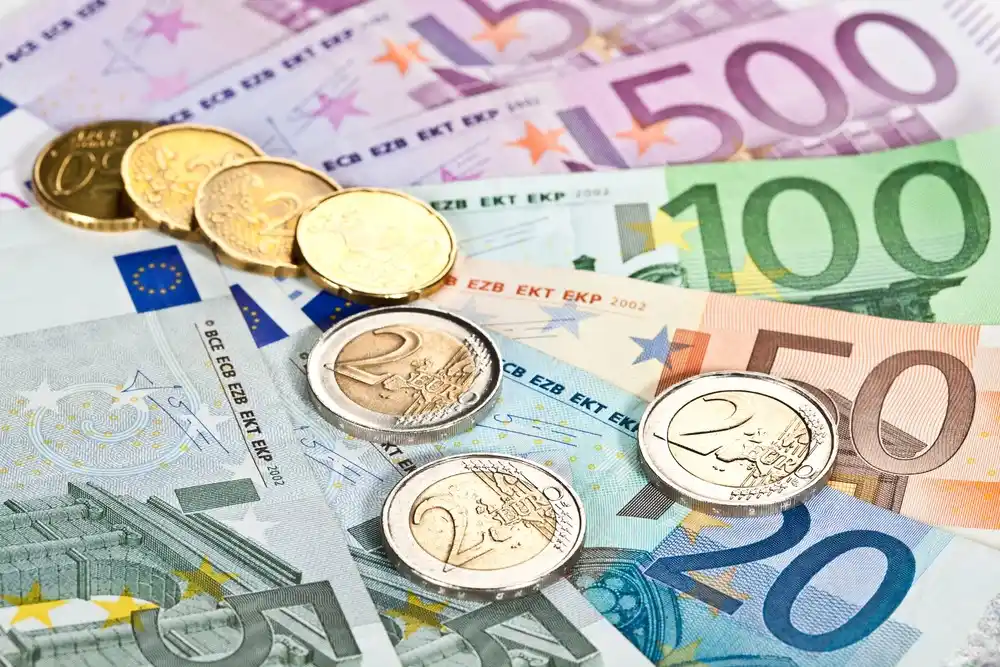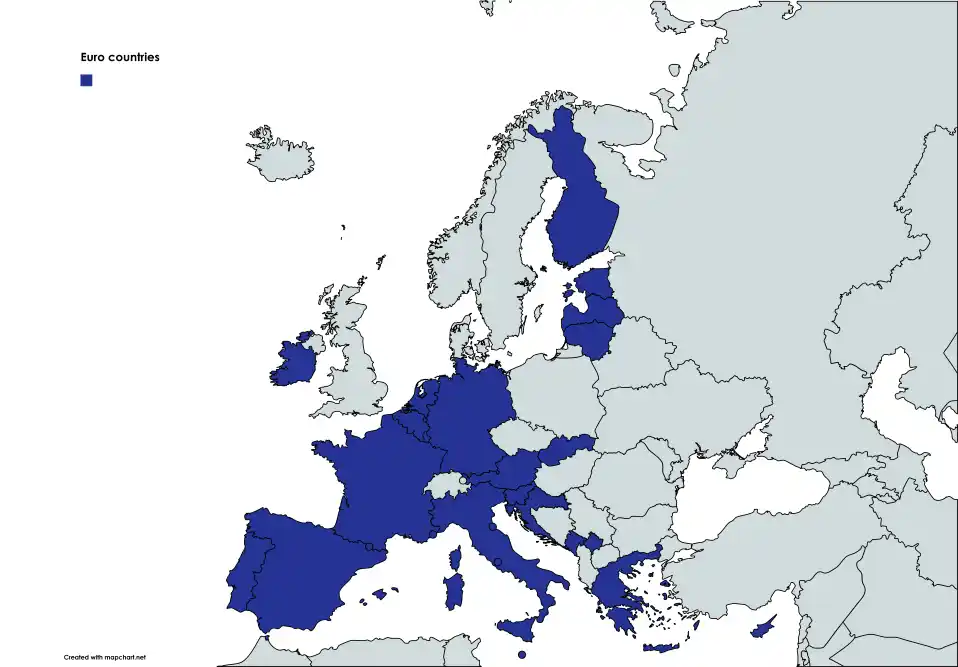One of the most important things to consider when traveling overseas is the local currency. Do you need to exchange money ahead of time? What’s the current exchange rate? These are questions worth answering before you hop on a plane.
Speaking from experience — I once arrived in a foreign country completely unprepared. I didn’t know enough about the currency and ended up getting scammed within minutes of landing. It wasn’t a fun welcome, but it taught me a valuable lesson.
Let’s not dwell on mistakes, though. The key takeaway? Know the currency before you go. Take a few minutes to familiarize yourself with what’s used locally, get a rough idea of everyday prices, and you’ll walk into situations like catching a taxi, booking a hotel, or eating at a restaurant with far more confidence and awareness.

What countries use Euro?
If you’re heading to Europe, chances are you’ll visit a country that uses the Euro (€). This is the official currency of most European Union (EU) member states and a few others that have adopted it for convenience and stability.
That said, not every European country uses the Euro. Some EU members have chosen to stick with their own national currencies, and a few non-EU countries have adopted the Euro unofficially.
Here’s a handy table of countries where the Euro is used:
| Country | Country Capital | Currency | Accept Euro? | Continent |
|---|---|---|---|---|
| Albania | Tirana | Albanian lek | Yes, widely accepted | Europe |
| Andorra | Andorra la Vella | Euro | - | Europe |
| Austria | Vienna | Euro | - | Europe |
| Azerbaijan | Baku | Azerbaijani manat | Not accepted, exchange required | Asia, Europe |
| Belarus | Minsk | Belarusian ruble | Not accepted, exchange required | Europe |
| Belgium | Brussels | Euro | - | Europe |
| Bosnia and Herzegovina | Sarajevo | Convertible mark | Accepted unofficially in some places | Europe |
| Bulgaria | Sofia | Bulgarian lev | Not accepted, exchange required | Europe |
| Croatia | Zagreb | Euro | - | Europe |
| Cyprus | Nicosia | Euro | - | Asia, Politically European |
| Czechia (Czech Republic) | Prague | Czech koruna | Depending on service | Europe |
| Denmark | Copenhagen | Danish krone | Depending on service | Europe |
| Estonia | Tallinn | Euro | - | Europe |
| Finland | Helsinki | Euro | - | Europe |
| France | Paris | Euro | - | Europe |
| Georgia | Tbilisi | Georgian lari | Depending on service | Europe, Asia |
| Germany | Berlin | Euro | - | Europe |
| Greece | Athens | Euro | - | Europe |
| Holy See (Vatican City) | Vatican City | Euro | - | Europe |
| Hungary | Budapest | Hungarian forint | Depending on service | Europe |
| Iceland | Reykjavík | Icelandic króna | Depending on service | Europe |
| Ireland | Dublin | Euro | - | Europe |
| Italy | Rome | Euro | - | Europe |
| Kazakhstan | Astana | Kazakhstani tenge | Not accepted, exchange required | Asia, Europe |
| Kosovo | Pristina | Euro | - | Europe |
| Latvia | Riga | Euro | - | Europe |
| Liechtenstein | Vaduz | Swiss franc | Yes, widely accepted | Europe |
| Lithuania | Vilnius | Euro | - | Europe |
| Luxembourg | Luxembourg | Euro | - | Europe |
| Malta | Valletta | Euro | - | Europe |
| Moldova | Chișinău | Moldovan leu | Yes, widely accepted | Europe |
| Monaco | Monaco | Euro | - | Europe |
| Montenegro | Podgorica | Euro | - | Europe |
| Netherlands, The | Amsterdam | Euro | - | Europe |
| North Macedonia | Skopje | Macedonian denar | Depending on service | Europe |
| Norway | Oslo | Norwegian krone | Not accepted, exchange required | Europe |
| Poland | Warsaw | Polish zloty | Depending on service | Europe |
| Portugal | Lisbon | Euro | - | Europe |
| Romania | Bucharest | Romanian Leu | Depending on service | Europe |
| Russia | Moscow | Russian ruble | Not accepted, exchange required | Asia, Europe |
| San Marino | San Marino | Euro | - | Europe |
| Serbia | Belgrade | Serbian dinar | Depending on service | Europe |
| Slovakia | Bratislava | Euro | - | Europe |
| Slovenia | Ljubljana | Euro | - | Europe |
| Spain | Madrid | Euro | - | Europe |
| Sweden | Stockholm | Swedish krona | Not accepted, exchange required | Europe |
| Switzerland | Bern | Swiss franc | Depending on service | Europe |
| Türkiye (Turkey) | Ankara | Turkish lira | Depending on service | Europe, Asia |
| Ukraine | Kyiv | Ukrainian hryvnia | Not accepted, exchange required | Europe |
| United Kingdom, The | London | Pound sterling | Not accepted, exchange required | Europe |

Table terms
“Not accepted, exchange required”: The euro is not used in day-to-day transactions, even in tourist areas.
Businesses, transport services, and shops typically only accept the official local currency, so you’ll need to exchange your Euros for local money upon arrival or, better yet, before your trip.
While you may be able to find currency exchange booths or withdraw cash from ATMs in the destination country, it’s important not to rely on the Euro being accepted for payments.
Carrying the local currency will help you avoid payment issues and ensure smoother travel.
“Depending on the service”: In some countries that don’t officially use the Euro, certain services, especially those aimed at tourists, may still accept it.
For example, international hotels, car rental companies, or popular restaurants might allow you to pay in Euros even if it’s not the national currency.
However, this is not guaranteed and often depends on the individual business. It’s always safest to carry the local currency or check in advance if Euros will be accepted.
Why the Euro is “widely accepted” in some countries
In certain countries where the Euro isn’t the official currency, it’s still widely accepted, particularly in tourist areas, border regions, or places with strong economic ties to the Eurozone.
This is often due to the country’s reliance on tourism, remittances from citizens working abroad, or the informal use of the Euro in parallel with the local currency.
Examples include:
- Albania – While the Albanian lek is the official currency, Euros are commonly accepted in hotels, travel agencies, and coastal tourist destinations. Many Albanians receive remittances from family members working in the EU, increasing the presence of the Euro in everyday transactions.
- Moldova – In cities and at border crossings, many businesses accept Euros. Remittances from Moldovan citizens working in EU countries make the Euro a familiar and useful currency locally.
- Liechtenstein – Although it officially uses the Swiss franc, its close proximity to Euro-using countries like Austria means that Euros are frequently accepted, particularly in retail and tourism sectors.
Territories that accept the Euro
Several territories outside mainland Europe officially use the euro as their currency due to their political ties to European Union member states. These include overseas territories and autonomous regions of France, Spain, and Portugal.
| Territory | Capital | Currency | Administrative country | Continent |
|---|---|---|---|---|
| Azores | Ponta Delgada | Euro | Portugal | Europe |
| Canaries | Las Palmas de Gran Canaria | Euro | Spain | Africa |
| Ceuta and Melilla | Ceuta and Melilla | Euro | Spain | Africa |
| French Guiana | Cayenne | Euro | France | South America |
| Guadeloupe | Basse-Terre | Euro | France | North America (Caribbean) |
| Madeira | Funchal | Euro | Portugal | Europe |
| Martinique | Fort-de-France | Euro | France | North America (Caribbean) |
| Mayotte | Mamoudzou | Euro | France | Africa |
| Réunion | Saint-Denis | Euro | France | Africa |
| Saint Barthélemy | Gustavia | Euro | France | North America (Caribbean) |
| Saint Pierre and Miquelon | Saint-Pierre | Euro | France | North America |
Although these regions are geographically spread across Africa, the Caribbean, and South America, they are politically linked to eurozone countries, making the euro their official currency.
Tip: try to have some cash on hand before you land!
While some countries may accept Euros in certain situations, it’s always best to get the local currency before you arrive.
This helps you avoid unfavorable exchange rates at airports, limits the risk of scams, and ensures you can pay for essentials like transport, food, or entry fees, especially in places that deal primarily in their national currency.
Having local cash on hand gives you more confidence and flexibility from the moment you land.
Caitriona Maria is an education writer and owner of The Facts Institute. A teacher for seven years, she has been committed to providing students with the best learning opportunities possible, both domestically and abroad. Dedicated to unlocking students' potential, Caitriona has taught English in several countries and continues to explore new cultures through her travels.